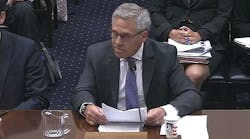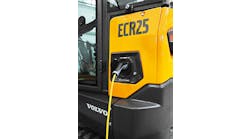Cummins executive Tony Satterthwaite told a U.S. House Select Committee recently that policy decisions promoting energy diversity are the best way to address climate change in the heavy-duty transportation sector. Satterthwaite, president of the Distribution segment at Cummins, said a diversity of fuels, including diesel, natural gas, electrified power and developing technologies such as hydrogen fuel cells give customers the chance to pick what works best for their circumstances.
“As we look to the future of the heavy-duty transportation sector, we see a sector that is highly complex and one in which we don’t believe there will be one technological solution that will meet all needs,” Satterthwaite told the House Select Committee on Climate Crisis. “Public policy plays an important role in facilitating this energy diverse future. We think the best policies are ones that don’t pick winners and losers but focus on desired outcomes. The best technology to solve a problem today may not be the best in six months or two years.”
Cummins is committed to investing in an energy diverse future where its customers have a broad portfolio of power options including clean diesel, natural gas, electrified power and fuel cell technology. While best known for its diesel and natural gas engines, the company established its electrified power segment in 2018 and recently announced it had entered into an agreement to acquire fuel cell systems provider Hydrogenics Corp.
Satterthwaite said climate change is a significant threat and encouraged it to take steps promoting innovation, especially in the development of energy infrastructure. He said it might be some time for all communities to have access to the full range of energy options.
Cummins believes, for example, that some of its customers may opt for clean diesel as the infrastructure is developed across the country for electrified power. Clean diesel has made significant strides, since it would take 60 of today’s diesel trucks to equal the emissions of a new truck sold in 1988.
Enacting policies that promote the power of choice for every market will help ensure that every community has the proven technology necessary to meet air quality and climate goals while promoting economic growth.
The hearing was titled “Solving the Climate Crisis: Cleaning Up Heavy-Duty Vehicles, Protecting Communities.” The committee’s goal is to reduce carbon within the heavy-duty transportation sector, with a primary focuzs on electrification. Cummins was invited to give its perspective on energy diversity.
Cummins is the largest independent producer of diesel engines and diverse power solutions in the world, it said, and it embraced regulations 30 years ago, developing technology that enabled it to meet standards that reduced particulate matter emissions in the diesel engine by 90 percent and oxides of nitrogen emissions by 95 percent while improving fuel efficiency.
PM and NOx are key contributors to smog while improving fuel economy reduces carbon dioxide, a key component to climate change. Cummins has set specific goals to reduce the waste it produces and the water and energy it uses and recently announced it had met its goal two years early to partner with customers to improve the efficiency of its products. Cummins fuel teams have conducted nearly 300 projects with customers since 2014 to reach an annual run rate reduction of 3.5 million metric tons of CO2.






